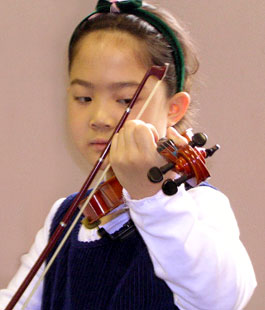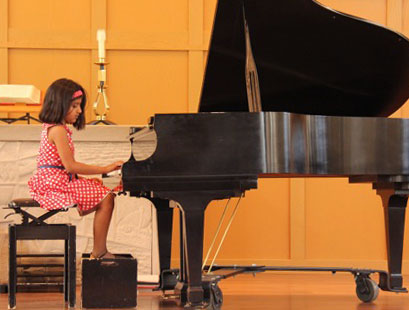


Frequently Asked Questions
How does the Suzuki Method differ from other methods of teaching music to children?
Here are some of the basic differences:
- • Suzuki teachers believe that musical ability can be developed in all children
- • Students begin at young ages
- • Parents play an active role in the learning process
- • Children become comfortable with the instrument before learning to read music
- • Technique is taught in the context of pieces rather than through dry technical exercises
- • Pieces are refined through constant review
- • Students perform frequently
Other aspects of the Suzuki Method are:
- • Fosters close parent/child relationships
- • Develops physical and aural awareness
- • Teaches concentration
- • Builds self-esteem and self confidence
- • Demonstrates the giving and receiving of respect
How do I choose a teacher for my child?
At our school, we request that the new student and parent observe lessons at least 4 times before registering. To assist this process, we provide observation forms for the parent. These forms list specific points to keep in mind while observing. This process informs the parent which teacher would be best for the family so that a successful and solid Suzuki Triangle of Teacher, Parent and Student can be formed. Once you have done the observation, schedule permitting, you can choose which teacher you feel best about. These observations may also help you and your child to determine which instrument you wish to focus on.
As a parent, how am I involved?
The parent's role starts with creating a musical environment for the child to absorb. However, the parent should never give the impressions that they are doing this for the child's benefit only. Enjoy the music yourself and your child will join in. The parent comes to every lesson and takes careful notes to ensure that the exact assignment is practiced at home. The parent need not be a musician to be a good "practice partner". With your teacher's guidance each parent can learn the basics required.
What is a musical environment?
Listening to the Suzuki repertoire is part of the foundation of the Suzuki Method. Repeated listening helps the student to be familiar with the repertoire and thus the learning process is facilitated. The student will absorb the language of music just as they do their mother tongue language. Whether in an active or passive listening state, their musical environment directly influences children. Listening to beautiful music on a regular basis as opposed to one that is discordant, vapid or full of rage, can only help to encourage the child towards Dr. Shinichi Suzuki's goal. As he said, "Teaching music is not may main purpose. I want to make good citizens, noble human beings. If a child hears fine music from the day of his birth, and learns to play it himself, he develops sensitivity, discipline and endurance. He gets a beautiful heart". All families of our school receive a list of recommended repertoire to help them build a musical library.
How can I schedule lessons?
Our teachers determine their lesson schedules on a yearly basis. Towards the end of the school year, the teachers work with parents to set lesson times for the following fall. Some changes do occur during the school year, however, most of the prime lesson times get booked quite quickly. Someone starting mid-way through the school year may or may not have many choices for available lessons times. When arranging observations with the teacher(s), discuss scheduling opportunities for new students. If your preferred teacher is booked and cannot accommodate your schedule, you can either get on her/his waiting list, or if possible make the needed changes to your personal schedule.
Does my child need to take group lessons?
Yes. Group classes are part of the program at our school. They are important to musical enrichment and act as aids to motivation in sharing times with other students and playing music. If the student does not attend group classes, the fees are still applicable. The only exception to this rule is when there is not an appropriate group for the student due to their age and/or ability. Students joining the school more that half way through the year may be asked to start groups in September.
How do I buy an instrument?
Violin teachers strongly urge all new violin students not to buy an instrument until your teacher has said they are ready. In the Suzuki approach, we usually start the child with a pre-violin, or box, to prepare the child for the real violin. When the child is given the box, they are not tempted to rush into doing activities on the instrument for which they are not physically or mentally prepared. This process is followed to insure that child's physical comfort with their violin and bow, and thus allows them to develop at their own pace. Once the teacher has determined the readiness of the child, parents can purchase or rent their instruments.
Some points to consider in purchasing violins:
- • With smaller sizes (1/16, 1/10, 1/8, ?) we usually advise getting a Suzuki Nagoya model. German and Czech models are also good, but slightly more expensive.
- • For small violins use Thomastik Superflex Strings (Dominant for ? plus sizes)
- • Wittner tailpieces are best for easier fine tuning use
- • Purchse wooden bows (not plastic) and make sure they are not warped
Some local dealers that we recommend:
- • The Soundpost www.thesoundpost.com
- • George Heinl & Sons www.goergeheinl.com
- • Remenyi House of Music www.remenyi.com
- • Philip Davis, 67 Wolverleigh Blvd., 416-466-9619 (luthier)
When purchasing a Piano, it is best to do a bit of homework, so if you are in a rush because your child is starting lessons right away, you may want to consider renting while you research. A piano is generally an expensive investment, and comparable to a vehicle in that there are hundreds of different moving parts. However, unlike a vehicle, the piano does not depreciate in the same extreme manner but holds its value for many years. This is especially true for a good quality instrument.
To start, we generally recommend that parents read "The Piano Book" by Larry Fine. Written in layman's terms, you can skim through to the sections that apply to you – buying new, used, marketing, etc., or read the entire enjoyable book. Familiarize yourself with the basic mechanics of the piano. Listen to different instruments, even those that are too expensive, so that your ear will develop a sense of what you prefer in sound quality.
Apartment sized instruments are generally of poorer quality and are not of great value as a new instrument or as a used instrument. A more advanced student will require this poorer instrument to be replaced. For good resonance and proper scaling of strings and ratio of action pieces, try to purchase a taller upright or longer grand piano. Beware of the deal you can't miss out on. If the price is too good to be true, there is usually a good reason for this. Even though your child may only be a beginner, playing on an instrument that has good tone and resonance, and is correctly responsive to touch when played quickly or slowly can only enhance the learning process and the joy of playing. Buying an instrument of good quality is an investment in your family's future!
Where else can I find out more about the Suzuki Method?
One of the prerequisites to registration is to read one of the books by Dr. Shinichi Suzuki.
Some other books of interest are:
Shinichi Suzuki: The Man and His Philosophy, by Evelyn Hermann
My Life with Suzuki, by Waltrand Suzuki
Suzuki Changed My Life, by Masaaki Honda
Suzuki Education in Action, by Clifford Cook
Introducing Suzuki Piano, by Doris Koppelman
Journey Down the Kreisler Highway, by Craig Timmermann
The Suzuki Violinist, by William Starr
A Parent's Guide to String Instrument Study, by Lorraine Fink
Studying Suzuki Piano: More Than Music, by Bigler/Lloyd-Watts
To Learn With Love, by William & Contance Starr
First Class Tips for Suzuki Parents, by Suzuki Association of the Americas
Suzuki Twinkles, An Intimate Portrait, by Dr. Alfred Garson
The Suzuki Concept, by S. Suzuki
Helping Parents Practice, by Edmund Sprunger
Since enrolling my
boys in music lessons, we've learned more than how to play the piano. Shinichi
Suzuki's books have inspired me, and the reading lists that Maureen provided, have influenced my parenting philosophy, and pedagogical approach in a way I hadn't imagined.
M. Morishita
We are extremely fortunate to have a teacher who is so passionate and dedicated to her art
and to her students.
We appreciate her providing such a positive and nurturing environment to not only our children but
to us as well.
M. Prosserman